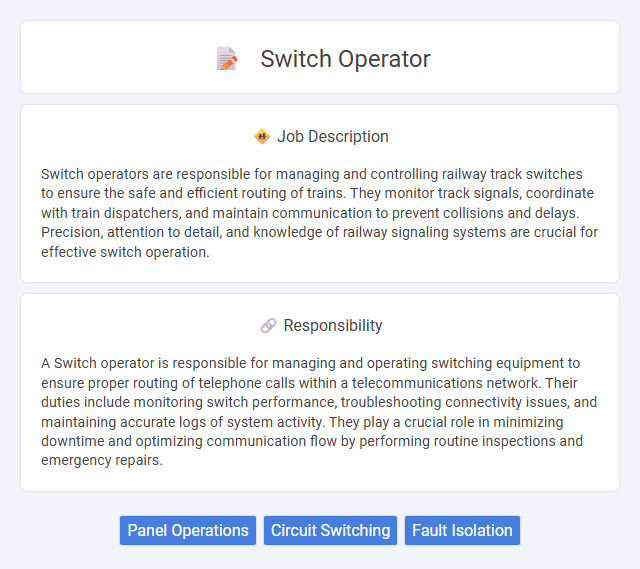
Switch operators are responsible for managing and controlling railway track switches to ensure the safe and efficient routing of trains. They monitor track signals, coordinate with train dispatchers, and maintain communication to prevent collisions and delays. Precision, attention to detail, and knowledge of railway signaling systems are crucial for effective switch operation.
Individuals who thrive in fast-paced environments and possess strong multitasking abilities are likely suitable for a Switch operator role. Those with good communication skills and the capacity to handle stressful situations may find this job aligns well with their strengths. People who prefer routine and minimal interaction might face challenges adapting to the dynamic nature of switch operator responsibilities.
Qualification
A Switch operator must have strong technical skills in telecommunications and network management, typically requiring a high school diploma or equivalent, with many employers preferring candidates with an associate degree or technical certification in electronics or telecommunications. Proficiency in operating and troubleshooting digital and analog switching equipment, as well as familiarity with computer systems and software relevant to network operations, is essential. Attention to detail, problem-solving abilities, and the capacity to work under pressure in fast-paced environments are critical qualifications for success in this role.
Responsibility
A Switch operator is responsible for managing and operating switching equipment to ensure proper routing of telephone calls within a telecommunications network. Their duties include monitoring switch performance, troubleshooting connectivity issues, and maintaining accurate logs of system activity. They play a crucial role in minimizing downtime and optimizing communication flow by performing routine inspections and emergency repairs.
Benefit
Switch operator jobs likely offer benefits such as stable income, comprehensive health insurance, and potential retirement plans. Employees probably gain opportunities for skill development and on-the-job training, enhancing career growth. Work schedules may allow for consistent hours, contributing to work-life balance and job satisfaction.
Challenge
The role of a Switch operator likely presents significant challenges related to maintaining seamless network connectivity under pressure. Operators probably face high-stress situations requiring quick decision-making to prevent system outages or data loss. Mastery of technical skills and the ability to troubleshoot complex issues rapidly may be crucial for success in this demanding position.
Career Advancement
Switch operator roles provide critical experience in managing telecommunications and network routing systems, offering a strong foundation for career advancement in the IT and communications sectors. Mastery of complex switching protocols and real-time troubleshooting enhances eligibility for higher positions such as network engineer or systems administrator. Continuous skill development in emerging technologies can accelerate growth into specialized roles like network architect or operations manager.
Key Terms
Panel Operations
Switch operators in panel operations are responsible for managing the electrical switches and circuit breakers in power distribution panels to ensure reliable energy flow and safety. They monitor and control the operation of switchgear equipment, execute switching procedures, and respond rapidly to electrical faults or maintenance requirements. Proficiency in interpreting electrical diagrams and adhering to safety protocols is critical for maintaining system stability and preventing outages.
Circuit Switching
Circuit switching is a fundamental method used by switch operators to establish a dedicated communication path between two endpoints for the duration of a transmission session. This process ensures a continuous and exclusive connection, providing reliable and predictable data transfer, especially in traditional telecommunication networks. Switch operators manage and monitor these circuits to optimize network performance and minimize call drops.
Fault Isolation
A Switch Operator is responsible for monitoring and controlling telecommunications switch systems to ensure efficient network performance. Fault isolation involves diagnosing and identifying the source of network failures or disruptions rapidly, minimizing downtime and service interruptions. Expertise in signaling protocols and network topology is essential to accurately pinpoint and resolve switch faults in real-time.
 kuljobs.com
kuljobs.com